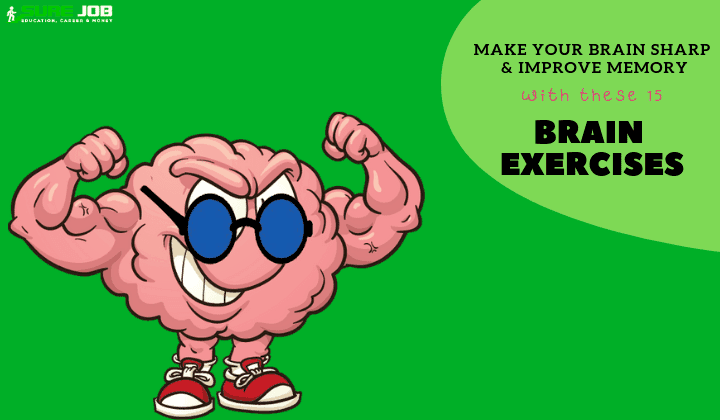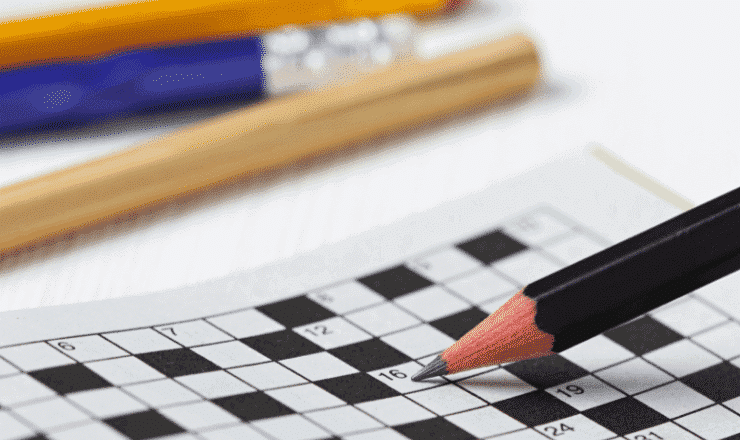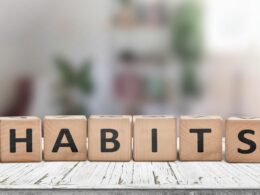Did you know that our brain weighs around three pounds and contains over 100 million neurons that carry information to and from nearly 100 trillion cells in our body connected to more than 100 billion nerve cells?
Possibly not. But you'd surely know that the brain is the essential organ of the human body and is responsible for all our functions. So, we must do brain exercises for the smooth functioning of the mind.

The brain works round the clock and keeps learning. Part of the human brain keeps learning even while we are asleep. What the brain learns becomes a memory.
Defining Memory & Learning
In simple terms, memory is the information we receive from our five senses- sound, smell, sight, taste, and touch that the brain stores for future reference. What the brain learns from our senses, it stores as memory.
And memory plays a vital role in every single feature of our life on this planet. Memory decides grades we score as students.
Memory is important while performing any tasks, whether a job, business, or household chores. It holds the key to the safety and security of our frail human life.
The brain never stops working till we're alive and keeps learning newer things practically every moment. Hence, it is vital to keep our minds sharp and intelligent. A sharper brain learns more.
Thanks to modern science, it is now possible to keep our minds sharp and intelligent. There are several time-tested and proven brain exercises that help us to keep learning.
15 Best Brain Exercises to Keep Learning
“The key to success is a dedication to life-long learning,” says Dr. Stephen R. Covey, author of bestseller ‘The 7 Habits of Highly Effective People,” and motivational speaker.
This quote speaks directly about the importance of life-long learning. Hence, we look at some of the best brain exercises to keep learning.
1. Take Free IQ Test
IQ or Intelligence Quotient is a score from various tests designed to test human intelligence. Usually, all humans have an IQ score between 80 and 119, according to the latest standards of Stanford-Binet Intelligence Scale Fifth Edition.
Nowadays, most employers ask job seekers to undergo an IQ test to test their intelligence levels.
Taking a free IQ test of the Stanford-Binet Intelligence Scale Fifth Edition is one of the best brain exercise games to help you during studies and employment. It is a well-known fact that people with IQ are better learners.
There are also several free IQ tests available online. You can try these too. However, some of these free tests might not be according to the Stanford-Binet Intelligence Scale Fifth Edition standards. Yet, they are worth trying and provide good entertainment too.
2. Read ‘The Net and The Butterfly’
Olivia Fox Cabane and Judah Pollack wrote a wonderful book titled ‘The Net and the Butterfly.' In this book, the brain is described as a beautiful butterfly that's hard to catch.
Hence, we need a ‘net' to catch this ‘butterfly.' This means we require some practice to control our brain and use it for maximum benefits.
The book is available online and at upmarket bookstores in India. It is very interesting to read. This book also contains some interesting, unique, and amazing brain exercises that you can try at home or the workplace.
For example, one of these exercises is to imagine yourself living on a planet without gravity. Try these ground-breaking brain exercise games in The Net and the Butterfly to keep learning.
3. Solve Crosswords

Crosswords can be found in your daily newspaper and in the language of your choice. Indeed, you might have seen some senior citizens sitting newspaper with pen or pencil in hand, trying to solve the daily crossword.
But if you believe that crosswords are only for retirees or people with no other work, think again. Crosswords are amazing brain exercise games to keep learning new words and improve your vocabulary in any language.
The first crossword in a newspaper was printed on December 21, 1913, by the New York World. By the 1920s, most major American newspapers began including crosswords in their daily or weekly editions.
This system is now popular around the world. Your daily newspaper would have one too. Crosswords have amazing health benefits for brains, though there's some debate over whether they actually help improve your word power.
4. Go for Quiz Contests
The humble quiz contest we would attend at school or higher education is an excellent brain exercise to keep learning. Whether we participate in a contest, listen to one on the radio, or watch TV, a quiz constantly stimulates our brains.
A correct answer gives that sense of satisfaction, while a wrong one provides an opportunity to learn.
Nowadays, we have several excellent quiz contests. These include the globally famous ‘Who Wants to be a Millionaire?' Hosted by world-famous celebrities to its Indian version ‘Kaun Banega Crorepati' where Bollywood megastar Amitabh Bachchan features as quizmaster.
Also, there are several quiz apps that you can download on a smartphone and answer questions to test and learn general knowledge. Some apps also pay money to winners of their online.
5. Name, Place, Animal, Thing
Did you play Name, Place, Animal, Thing, a simple game as a child? I remember playing it and winning it on a few occasions too.
This humble game of childhood is now very popular worldwide as an excellent brain exercise to keep learning. In fact, you can play the game online on a computer or by downloading an app on your mobile.
If you're wondering how this simple game is a superb brain exercise game, here's the answer. You get only a few seconds to write answers and stay in the game.
This race against time automatically stimulates the brain. And to know the right answers and write them in just a few seconds, you require proper general knowledge.
6. Mind Mapping
Mind Mapping? Yes. Mind Mapping is a technique developed by Tony Buzan, an English author, and educational consultant.
It is a brain exercise to improve memory that helps you learn new things, expand memory, improve creativity and develop analytical skills.
The only catch: Mind Mapping is not free. However, you can download a free trial version from their official version and try it out.
In fact, Mind Mapping is a technique that many global corporations utilize for a variety of purposes. It allows them to judge job seekers' skills and intelligence levels and helps train and keep employees sharp for better productivity.
Creating a Mind Map is a very sophisticated brain exercise game. If you can afford the $100 price tag for home users, it's definitely worth the investment.
7. Drawing
Drawing is something we did as toddlers at home and students at school. Over the years, we lost this simple art while the complexities of life took over. Yet, it's never too late for you to revive this skill and start drawing.
Because drawing is a fantastic brain exercise to keep learning, even as a grown-up, design historian DB Dowd writes in his book ‘Stick Figures: Drawing as a Human Practice' that drawing holds deeper benefits than mere entertainment.
He aptly points out that drawing anything helps us learn better, think better, and make us better humans. The book points out drawing develops observation, fosters analytical skills, develops patience, and boosts humility.
He says that taking a paper and pencil or pen and drawing something from your memory or fancy is one of the best exercises to learn these vital skills.
8. Sudoku

Sudoku is a Japanese, number-based puzzle for those who don't know. It consists of nine grids where you have to fill numbers from 1 to 9 without any repetition. Nowadays, most major newspapers carry a Sudoku puzzle alongside a crossword and others.
As brain exercise games, Sudoku prevents or delays dementia due to aging. It also fosters logical thinking while helping you learn patience and perseverance.
You can begin by trying a simple Sudoku printed on your newspaper or attempt a free one online from its official website.
In Japan, several employers ask job seekers to solve a Sudoku before hiring since it indicates their level of logic, problem-solving, and analytical skills. Sudoku is one of the wonderful brain exercise games to learn some life skills.
9. Math Workouts
The very talk of mathematics would make me cringe as a student. It was the subject I hated most, and I'm still allergic to math. Whether or not we like it, math is an important subject at schools and colleges.
High math scores can get you admissions to coveted courses such as engineering and accountancy. And it's vital if you dream of becoming rich because money and math have very intimate relations.
During my student years, the Internet was something unimaginable. But now that it's a reality indulge in online Math Workouts. This is a brain exercise game to keep learning and upgrading your math skills.
They are available free online as single, dual, and multiple player exercises. Or simply download an app and have fun with math during free time.
Math workouts help students to senior citizens since mathematics is the only universal language.
10. Play Chess
No. Chess is not a sport as most people believe. Yes, it has all elements of sport such as rules and regulations, championships and tournaments, practice and training.
Yet, Chess is not officially a sport. At best, it is known as a mental exercise sport that includes extensive brain exercise games and physical fitness.
Anyone that plays Chess will testify how the game tests your alertness, analytical skills, cognitive abilities, and much more.
Playing a game of Chess at home, club, or even online provides excellent brain exercise to keep learning various essential skills necessary for success in life.
You learn sportsmanship, discipline, the value of time, thinking like an opponent, solving problems, and several other vital lessons by playing Chess. And you needn't be a grandmaster to play Chess.
Unconventional Brain Exercises to Keep Learning
While the above 10 brain exercise to keep learning are found worldwide, you can create some of your own too. Here are some unconventional brain exercises that you may never have heard about. Yet, they can be fun and teach you some vital skills.
11. Clean Your Room in Dark
Who would clean a room in the dark in this age of electricity? And what would one learn, you might ask? So let me tell you, cleaning your room in the dark is actually an excellent brain exercise game.
It has origins in monasteries and households of ancient Asia and Europe, where monks would tidy up their living places in the dark to save time for making the best use of dawn and sunlight.
Cleaning your room in the dark is a good brain exercise to keep learning various things. It teaches you how to handle fragile stuff with care, avoid bumping into things, know the right place for various stuff, find directions, and above all, teamwork.
This brain exercise is common in the militaries of the world. You can try this brain exercise with family, with some caution.
12. Budgeting Exercises
Want to teach kids and teenagers the importance of money? Try this fantastic budgeting exercise from Ulster Bank. This is a brain exercise game that is available for those between the ages of five and 18 years.
This brain exercise is available online on the website of Ulster Bank. For younger children, the exercise is simple such as collecting coins, counting them, and finding how to buy something.
However, this exercise gets more brutal and more challenging for older children. It includes challenges such as creating and managing the household budget, taking loans and credit and its repayment, managing college expenses, and other essentials, an excellent exercise for students to keep learning tricks and tweaks of saving and budgeting.
13. Referring Dictionary at Random

Referring to a dictionary at random is an excellent way to learn new words and their meaning. And find out more about words you already know and use commonly.
Most of us would search a dictionary only when necessary and encounter a rarely used word. Unfortunately, nobody uses such rare words nowadays.
The only instances you might come across are in novels where an author uses some esoteric word to describe something.
Open a dictionary at random and check out any word. Study the word, the correct pronunciation, and its origin (etymology). Some dictionaries also have examples of sentences using these words.
Try creating a few sentences with your newfound word. Some results might prove hilarious, but this brain exercise will help you gain excellent command of a language over a period of time.
14. Search Garbage Cans
You'd surely think I'm mad to suggest this. What type of brain exercise does garbage can hold, and what is there to keep learning, you would ask? A lot, in fact, is my honest answer. And with solid reasons too.
A garbage can is a representative of your school, college, home, community, or neighborhood. People throw all sorts of unwanted stuff- from uneaten food to old clothes, broken electronics- the list is endless. There are lessons to be learned in a garbage can indeed.
A lot of stuff that goes into the garbage can is actually destroying our planet through environmental pollution. Perfectly edible food lands in the trash because someone doesn't want to eat leftovers or stale stuff.
Meat and vegetable scrapings have better uses if someone takes extra effort. Looking into the garbage teaches a lot about saving the planet from pollution. It also gets you thinking about how to use waste for better purposes.
15. Eating Blindfolded

Yet another unconventional brain exercise game you can try is to eat blindfolded. This means you cannot see what you are eating.
If necessary, ask a relative or friend to feed you if getting food to your mouth would become a problem. Usually, it wouldn't be. Whichever way you choose, eat blindfolded as a brain exercise to keep learning.
Experiments worldwide prove people could appreciate food better when blindfolded. Since they can't see the food, people depend upon other senses such as smell, feel and taste to know what they are eating.
This helps them discover newer tastes of the same food, which could be something as simple as spinach. Try these brain exercise games often to keep learning the real taste of food.
Wrap Up
Besides these brain exercises to keep learning, you can also do a few more things to develop superb memory while avoiding age-related dementia and cognitive disorders.
They include daily meditation, avoiding alcohol and tobacco, a healthy diet, proper sleep, and regular physical exercise.
There are countless instances where people of very advanced age had sharp memories of events. This is only possible through proper care of the body and brain.
Hence, I recommend you also care for your body and brain and try these brain exercises to improve memory keep learning.








